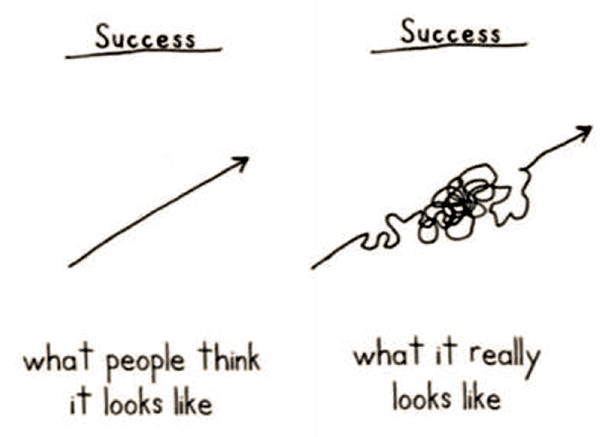Words of wisdom for the MBA class of 2018
Monday, July 18, 2016
Dear Incoming MBAs:
Your first year of business school is rapidly approaching! Soon, you’ll be moving from thinking about b-school to thinking about the details of b-school: your class schedule, recruiting deadlines, networking events, and more. Before you reach that point, here are three pieces of advice I wish I had been given as I headed into my first year:
1. Trust your instincts
Two weeks into business school, I nearly quit.
I entered b-school with a plan: Get a job in management consulting, gain several years of corporate experience, and then move into what I really wanted to do: for-profit social enterprise. To that end, I attended nearly a dozen corporate information sessions, hosted seventeen informational interviews (not an exaggeration!), and networked with, well, everyone in my first two weeks.
All my plan had accomplished was exhaustion and a sinking feeling that nothing was going to fit: None of the companies fit. None of the roles fit. I didn’t fit.
It was near my breaking point when Maggie Tomas, Director of our Graduate Business Career Center (GBCC), asked me a simple, yet powerful, question: What do you want?
I want to work at the intersection of social impact and for-profit enterprise.
I want to lead teams and organizations that make a difference in people’s lives.
I want to wake up energized every morning because I love my role and the organization I am a part of.
The next day, I stopped attending corporate info sessions; I started taking people out for coffee instead of doing formal informational interviews; and I placed a phone call to the President of Sunrise Banks, a mission-driven community bank I had encountered in my previous work, and asked her if they would consider hiring me as their first-ever MBA summer intern. (I started at Sunrise in May.)
During your admissions process, you wrote a brilliant essay laying out your short-term and long-term goals. You might follow that word-for-word. Or, you might get two weeks in and realize that the marketing track you thought you wanted to pursue doesn’t feel right. That’s ok. Trust your instincts. If it doesn’t feel right, don’t do it. Your instincts will lead you where you’re supposed to go.
2. Embrace the journey
A funny thing will happen about halfway through your first semester, usually around the time the first of your classmates receives a summer internship offer: People who weren’t attending info sessions before will start showing up to them. Classmates who seemed disengaged will trade in Happy Hour for informational interviews. The person sitting next to you in class will be refreshing TalentLink (our internal job-posting board) as if they were trying to get tickets to see Adele.
The flurry of activity that takes place as recruiting picks up is understandable, and the GBCC rightly pushes students to take their internship search seriously. At the same time, there is a deeper anxiety that underlies much of the process: What if I spend all this time and money and I don’t even get a job?
Listen: Carlson students have an insanely good job offer rate. 96% of the most recent graduating class had full-time job offers within 90 days of graduation. 100% of my class landed summer internship offers. There are no guarantees in life, but the chances of you not having a job of any kind two years from now are pretty slim.
Yet I have seen people attend info sessions for companies they’re not interested in and seriously consider job offers simply because they were first in line primarily because of the anxiety and fear they were experiencing over the balance of their bank account.
Remember this: You chose to be unemployed these next two years! In theory, you chose this path because you want something more. You want to advance in your previous career further than you would otherwise be able to. You want to step onto a new career path altogether. You want to gain the skills you need to start your own business or to lead an existing organization.
Whatever your reason for doing the MBA, hold on to it. Write it down. Keep it in front of you. Because the financial pressure, the anxiety, and the fear is very, very real. There may come a point when what you really need to do is just get a job. Eight weeks into your first semester probably isn’t it.
Hold on to your reason for being here, pursue what you really want, and be patient. Some of the most interesting and best opportunities for you might be the ones that don’t come via the traditional recruiting path – and they might come much later in the process than everything else. Don’t make decisions rooted in fear and anxiety; embrace the journey.
3. Go beyond the numbers
A few days into my internship, I was handed an M+A (mergers and acquisition) project: Analyze this company’s performance, consider the goals of our acquisition strategy, and craft a recommendation. Over the course of a few days, I dug into the company’s accounting statements, ran financial projections, and considered M+A best practices. I wouldn’t have known how to do any of those things before business school.
It wasn’t until a few days later that I realized what I had overlooked.
Business school is full of cases: Here’s a situation; what would you do? The result of this process is that you become increasingly analytical and data-driven. And that isn’t a bad thing. After all, using those skills, I had arrived at a strong business conclusion: By laying off the staff of this company and moving it to a more strategic location, we would accomplish our primary strategic goal at the lowest possible cost.
The problem was that I had completely failed to consider the human side of the equation: I had just recommended that we uproot a company that had been a centerpiece of its local community for more than 100 years and lay off its staff of 26 people who relied on it for their livelihoods – and getting there hadn’t even caused me to blink.
You are going to learn some amazing things in business school. And the tools you learn will be ones that can produce the correct business answer. But being a leader is about more than that.
A few weeks into my first semester, the Volkswagen emissions scandal came to light. A few weeks after that, Martin Shkreli, the former CEO of Turing Pharmaceuticals, which had raised the price of a life-saving HIV drug 5,556%, was arrested for securities fraud.
Business has incredible power – for good and for harm. This ancient art of exchanging goods and creating value impacts lives each and every day.
When you’re in accounting, remember that the figures you’re looking at represent more than just numbers on a page; they represent resources. When you’re in finance, remember that arriving at a positive financial return isn’t the only thing you should consider when embarking on a new project; you should consider what else you might do that could be even better. When you’re in strategy, remember that culture is more than a theory; it’s the driving force behind whether the people you work with are energized and excited about what they do, or whether they can’t wait to quit and go somewhere else.
Over these next two years, go beyond the numbers and become a leader, not just an MBA.
You are about to embark on an amazing two years of your life. Trust your instincts. Embrace the journey. And go beyond the numbers.
Enjoy the ride.


